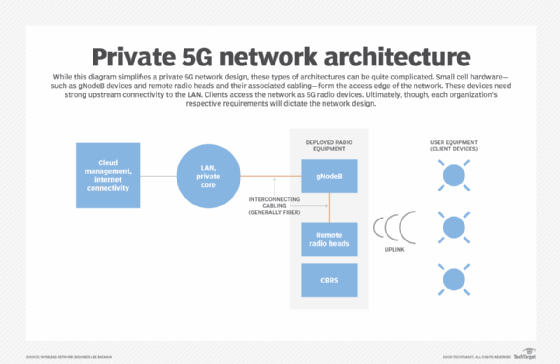
sarayut_sy - stock.adobe.com
Private 5G networks to gain momentum in 2021
Enterprises using industrial IoT devices are among the early adopters of private 5G networks, which could become an $8 billion market by 2027.
In 2021, private 5G will gain momentum in industries as organizations with industrial IoT systems seek to improve operations significantly.
A key driver behind the expected adoption of dedicated 5G networks is the availability of wireless spectrum. From July 23 to Aug. 25, 2020, the Federal Communications Commission held public auctions for the Citizens Broadband Radio Service, which operates in the 3.5 GHz band. The auction attracted carriers and enterprises, including heavy equipment manufacturer John Deere, which bought spectrum for use in its Iowa and Illinois facilities.
"[With 5G,] we're going to see a much more nimble and flexible manufacturing operation than what we've been able to do in the past," said Craig Sutton, innovation manager for John Deere's factories.
John Deere and other organizations with industrial IoT networks expect the low latency, speed and reliability of a 5G-powered wireless infrastructure to improve operations dramatically. Licensing the spectrum also places the network under their control, making them less dependent on carriers.
Adoption of private 5G within industries such as manufacturing, transportation and mining will help grow the market over the coming years. A Nemertes Research survey found that 62% of companies using or planning to use an IoT-specific network protocol in 2021 were either committed to or considering 5G.
To tap that emerging market, Nokia released its first private network product built solely on 5G technology in July. Previously, Nokia's products used 5G radios on 4G infrastructure. The latest offering will provide all the technical advantages unique to 5G.
In December, Affirmed Networks announced that Taiwanese manufacturer Inventec had selected it to provide a 5G network for its Taoyuan City campus. The network will support high-resolution cameras and AI systems used for quality control on the factory floor.
"We are seeing a number of deployments that make us feel the time [for private 5G] is here," said Affirmed executive Sanjay Mewada. Microsoft acquired Affirmed in March.
John Deere expects its private 5G network to replace the many Ethernet cables currently used to connect manufacturing equipment with control systems. The wired network makes it difficult and time-consuming to move gear or retool assembly lines.
"It's not that the ideas aren't there -- it's the work in the background to move all the connections around," Sutton said. "[With 5G,] we're going to see a much more nimble and flexible manufacturing operation than what we've been able to do in the past."
The company expects the FCC to release the spectrum in the first quarter of 2021, Sutton said. At that point, John Deere plans to run pilot programs, both in a testing lab and at one of its major plants.
"What we are really excited about is what's going to come after that," Sutton said. He estimates a 12- to 18-month rollout of the 5G network.
John Deere won't be the only organization chasing the benefits of a dedicated 5G network. In a September report, Polaris Market Research estimated that the global market for private 5G would grow from $924 million in 2020 to more than $8 billion by 2027.

Preparing for private 5G
Before committing to 5G, organizations should carefully consider whether future demands will outstrip their existing networks' capabilities, experts said. They should also look at less expensive alternatives, such as Wi-Fi 6 or a private 4G network.
John Deere settled on 5G after taking into account the number of complicated devices the manufacturer planned to add to its factories over the next several years. "We didn't want to get so many months down the road and start finding out that there are some very important use cases that weren't going to be viable because of the network," Sutton said.
Organizations that want to upgrade to a 5G network should start the planning process early, said Stephane Daeuble, the marketing head for Nokia's enterprise products. That's because manufacturers often underestimate the time required to convert a factory to wireless technology.
"It's a long journey," he said.







